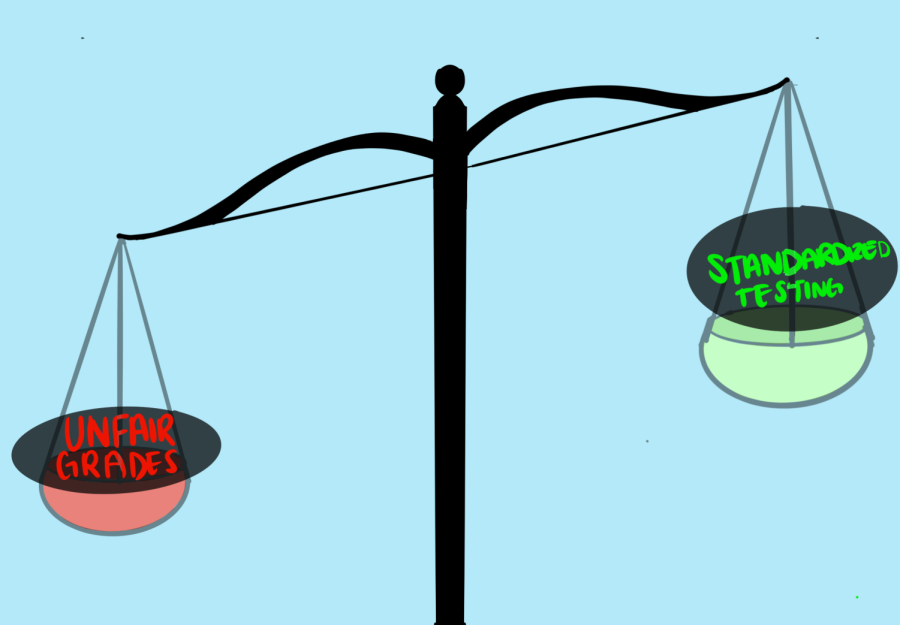[Opinion] Standardized testing is necessary
Standardized testing is necessary because it fairly assesses students’ levels.
April 21, 2022
In recent years, there have been a wave of complaints from parents, teachers and students alike regarding standardized testing. However, it is important to look past the backlash in order to realize the wide range of benefits that standardized testing can offer.
Across the United States, there are various standardized tests for several purposes such as fulfilling a graduation requirement or gaining a college credit. Some examples of standardized tests are the SAT, ACT, PERT and Advanced Placement (AP) tests.
These tests, in addition to other standardized tests, serve as an objective measurement of education and provide a good metric to gauge areas for improvement.
Many have argued that teachers’ grades are sufficient when it comes to measuring students’ success. In reality, grading practices and class difficulty can vary widely across the nation. For example, in one school, a science teacher may grade extremely harshly while at another school, a science teacher teaching the same subject may be a more lenient grader. This can result in an unfair grading process that can affect students’ GPAs and future college acceptances.
Additionally, like any other human being, teachers can have either a conscious or unconscious bias that can affect the grades they give. For example, they may award a higher grade to a student with good participation or attendance and a low grade to a student who rarely pays attention, even if neither deserve it.
Therefore, standardized tests play an important role when it comes to combating teacher bias and creating an equal playing field for students to display their skills.
Moreover, standardized tests offer meaningful data that can benefit students in marginalized groups. If parents and teachers do not have testing data to ensure that the student is on the right track, there is no opportunity to intervene and get them help before they are far off track. If there were no standardized tests, the community can’t say this school is doing well, this teacher needs help to improve, or this system needs new leadership. Testing is a tool for us to hold the school system accountable to make sure our kids have what they need.
These assessments have highlighted the differences between various teachers, counties and districts alongside having led to improvements in access to instruction for students with disabilities and English learners. Inclusion of marginalized students, such as those with disabilities or English learners, in standardized tests allows us to measure how well the system is doing for these students, and allows us to fill in gaps in instructional opportunity.
Additionally, standardized tests can be useful for teacher evaluations. While there are other components that come into play for a teacher’s evaluation such as student grades, standardized tests provide a universal measure across the nation. Teacher’s test scores can then be compared to how each teacher has helped students master core concepts.
The more data that can be provided, the more accurate the teacher evaluation decisions will be. Teacher evaluations should incorporate as many pieces of data as possible.
Lastly, standardized test scores are good indicators of future success as they can promote academic rigor, which is invaluable in college as well as in students’ careers. The assessments can help students improve test scores and are linked to better adult outcomes such as college attendance, higher incomes and the avoidance of risky behavior.
The information that the SAT, ACT and other standardized tests are now evaluating are essential for all students, not only those who plan on attending a four-year college. They are also helpful for those who plan to participate in Career & Technical Education (CTE) programs or choose to seek employment requiring associate degrees and certificates.
Standardized test scores have long been correlated with better college and life outcomes. As Dan Goldhaber, PhD, Director of the Center for Analysis of Longitudinal Data in Education Research summarizes, “students who score one standard deviation higher on math tests at the end of high school have been shown to earn 12% more annually, or $3,600 for each year of work life.”
Overall, it is clear to see that standardized testing has more benefits than downsides as it provides a level playing field for students to prove their skills, a better chance at succeeding in college and a career and is a useful way to measure teachers to see what areas they need to improve in.












